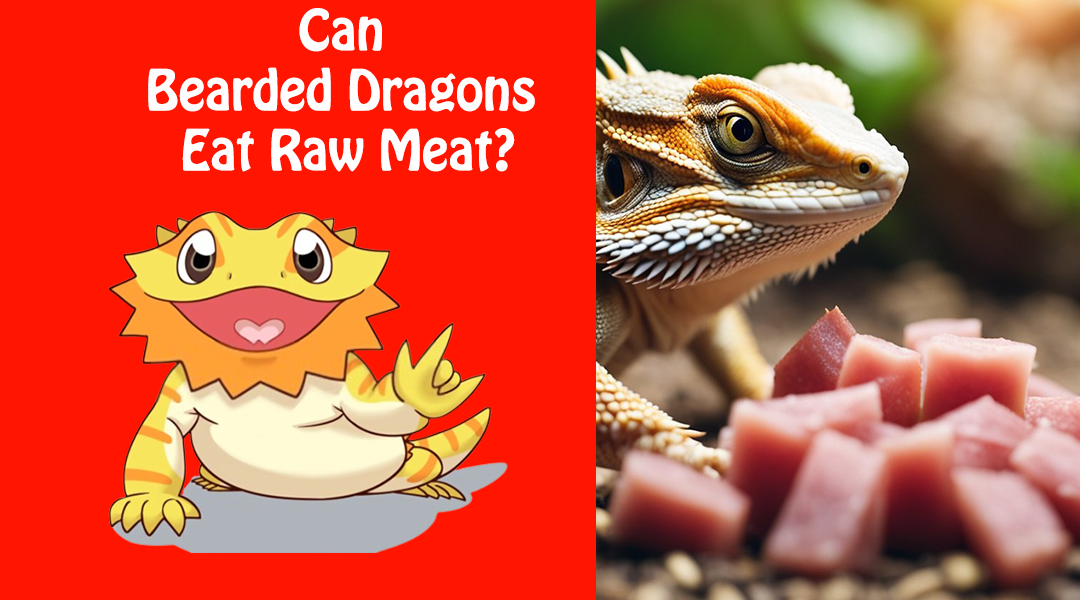Bearded dragons are popular pets among reptile enthusiasts due to their docile nature and unique appearance. As omnivores, they require a balanced diet consisting of both plant and animal matter. While many owners feed their bearded dragons a diet of insects and vegetables, some may wonder if raw meat is a suitable option.
Raw meat can pose a potential risk to bearded dragons as it may contain harmful bacteria such as Salmonella and E. coli. These bacteria can cause serious health issues in reptiles and even lead to death. Therefore, it is important to handle raw meat with care and ensure that it is thoroughly cooked before feeding it to your bearded dragon.
Additionally, bearded dragons are not natural carnivores and do not require a diet solely consisting of meat. In the wild, they primarily feed on insects, vegetation, and occasionally small rodents. While offering a small amount of cooked meat as a treat may be acceptable, it should not make up a significant portion of their diet. Overall, it is best to stick to a balanced diet of insects, vegetables, and occasional fruits for your bearded dragon’s health and well-being.
Bearded Dragon Diet Basics
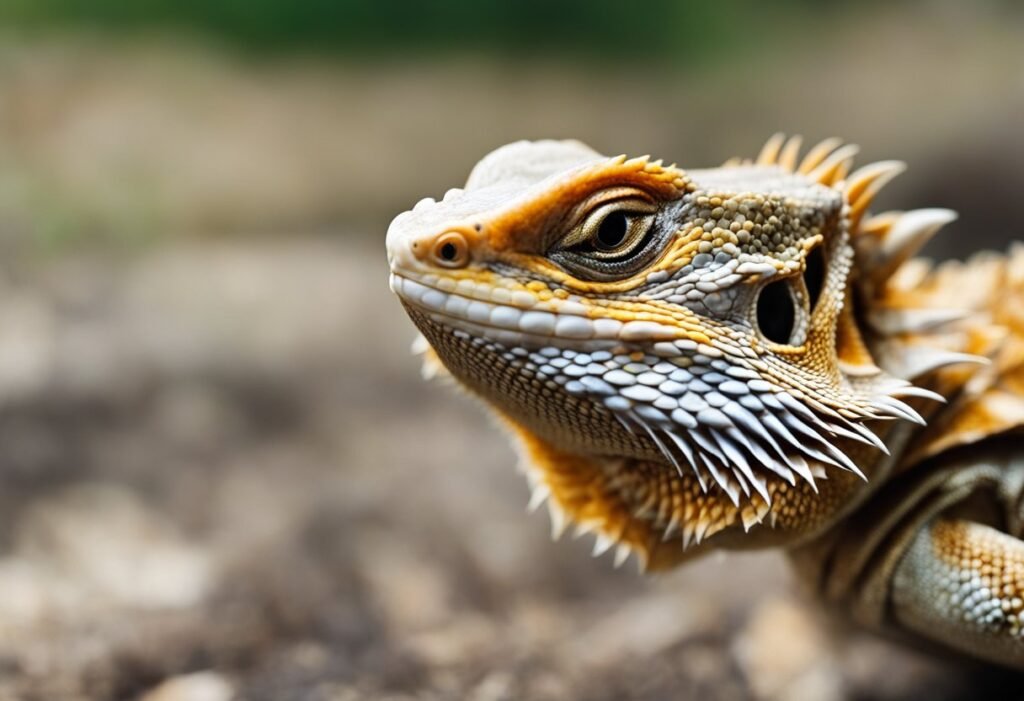
As responsible pet owners, we want to ensure that our bearded dragons are getting the proper nutrition they need to thrive. In this section, we’ll cover the basics of a bearded dragon’s diet, including their nutritional requirements and safe foods.
Nutritional Requirements
Bearded dragons are omnivores, which means they eat both plants and animals. They require a balanced diet that includes a variety of nutrients, including protein, fiber, vitamins, and minerals.
Protein is essential for muscle growth and repair, and bearded dragons require a high protein diet. In the wild, they primarily eat insects, but they can also eat small mammals and reptiles. In captivity, we can provide them with a variety of protein sources, including crickets, mealworms, and dubia roaches.
Fiber is also important for bearded dragons, as it helps with digestion and prevents constipation. We can provide fiber to our bearded dragons through a variety of vegetables, including collard greens, kale, and squash.
Bearded dragons also require vitamins and minerals, including calcium and vitamin D3. Calcium is important for bone health, and vitamin D3 helps with calcium absorption. We can provide these nutrients through a variety of supplements, including calcium powder and UVB lighting.
Safe Foods for Bearded Dragons
When it comes to feeding our bearded dragons, it’s important to stick to safe foods. Some foods can be toxic to bearded dragons, so we need to be mindful of what we’re feeding them.
Safe protein sources for bearded dragons include crickets, mealworms, dubia roaches, and pinkie mice. We should avoid feeding them wild-caught insects, as they can contain pesticides and other harmful chemicals.
Safe vegetables for bearded dragons include collard greens, kale, squash, and carrots. We should avoid feeding them spinach, as it can bind to calcium and prevent absorption.
In conclusion, a balanced diet is essential for our bearded dragon’s health and well-being. By providing them with a variety of protein sources and vegetables, as well as supplements for vitamins and minerals, we can ensure that they’re getting the nutrients they need to thrive.
Risks of Feeding Raw Meat
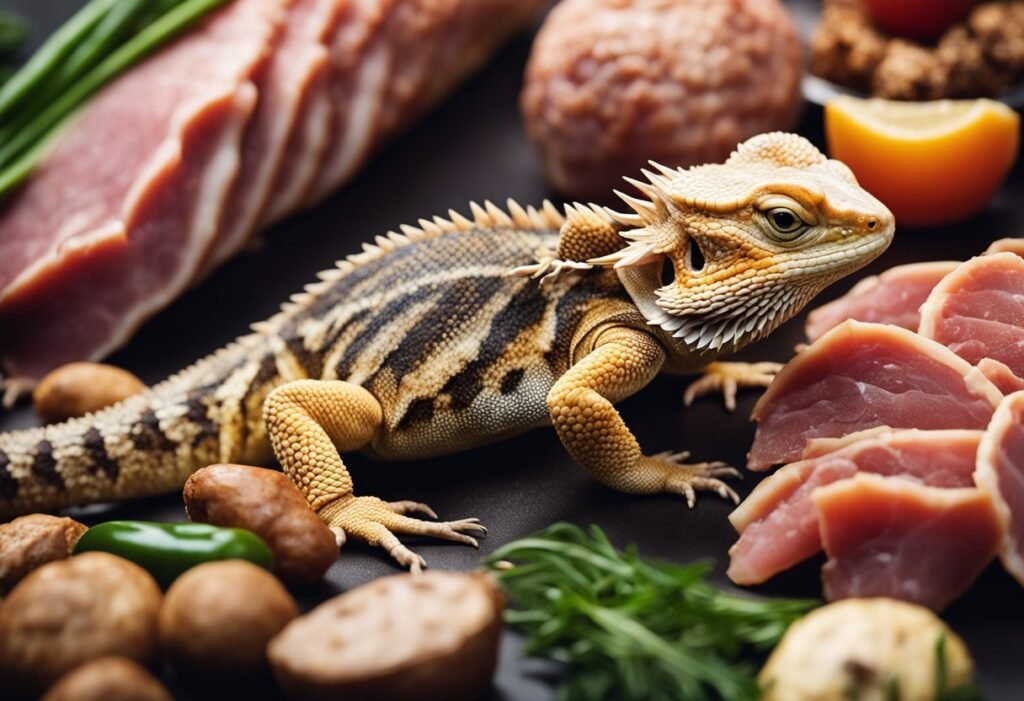
Feeding raw meat to bearded dragons can be potentially dangerous and harmful to their health. Below are some of the risks associated with feeding raw meat to bearded dragons.
Parasites and Bacteria
Raw meat can carry parasites and bacteria that can cause serious health problems for bearded dragons. Salmonella and E. coli are two common bacteria that can be found in raw meat and can cause severe digestive problems in bearded dragons. Parasites such as tapeworms and roundworms can also be present in raw meat, which can lead to serious health issues.
Digestive Issues
Bearded dragons are not adapted to digest raw meat, which can lead to digestive issues such as constipation, diarrhea, and impaction. Raw meat can also cause inflammation in the digestive tract, which can lead to serious health issues if left untreated.
Nutritional Imbalance
Feeding raw meat to bearded dragons can lead to a nutritional imbalance in their diet. Raw meat is high in protein but lacks essential vitamins and minerals that bearded dragons need to stay healthy. Over time, feeding raw meat can lead to deficiencies in important nutrients such as calcium and vitamin D3, which can cause metabolic bone disease.
In conclusion, feeding raw meat to bearded dragons can be potentially dangerous and harmful to their health. It is important to provide a balanced and nutritious diet to ensure the health and well-being of your bearded dragon.
Proper Feeding Practices
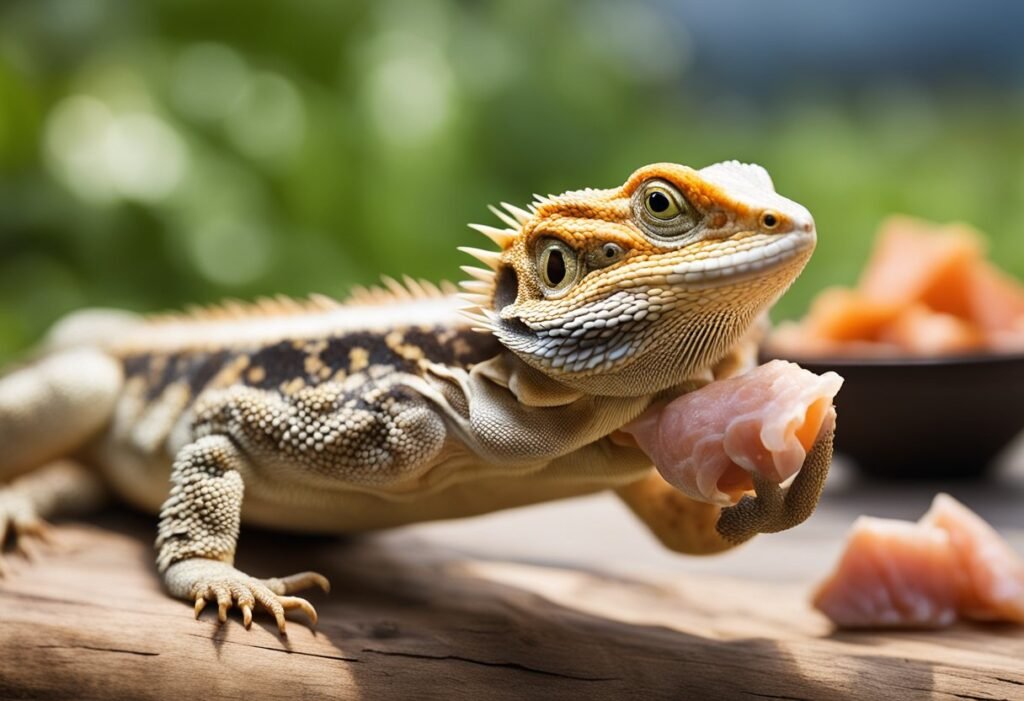
When it comes to feeding bearded dragons, it’s important to follow proper feeding practices to ensure their health and well-being. Here are some guidelines to follow:
Feeding Schedule
Bearded dragons should be fed once a day, preferably in the morning. It’s important to establish a consistent feeding schedule to help regulate their digestive system.
Portion Control
It’s important to feed bearded dragons the appropriate amount of food. Overfeeding can lead to obesity and other health issues. A good rule of thumb is to feed them as much as they can eat in 10-15 minutes.
Food Preparation
Bearded dragons can eat both raw and cooked meat. However, it’s important to prepare the food properly. Raw meat should be thoroughly cleaned and cooked to kill any bacteria or parasites. It’s also important to remove any bones or excess fat.
When feeding cooked meat, it’s important to avoid seasoning or adding any spices. Plain, unseasoned meat is best. Additionally, fruits and vegetables should be washed thoroughly before feeding to remove any pesticides or other harmful chemicals.
By following these proper feeding practices, you can help ensure your bearded dragon stays healthy and happy.
Healthy Alternatives to Raw Meat
When it comes to feeding our bearded dragons, we want to ensure that they are getting the best nutrition possible. While raw meat may be a tempting option, there are many healthy alternatives that can provide the necessary nutrients for our scaly friends.
Insects and Worms
One of the most popular food choices for bearded dragons are insects and worms. These provide a great source of protein and can be found in most pet stores. Some popular options include crickets, mealworms, and waxworms. It is important to ensure that these insects are gut loaded, meaning they have been fed a nutritious diet before being fed to your bearded dragon.
Vegetables and Fruits
Another healthy alternative to raw meat are vegetables and fruits. These provide a great source of vitamins and minerals that are essential for your bearded dragon’s health. Some popular options include collard greens, kale, carrots, and sweet potatoes. It is important to note that not all fruits and vegetables are safe for bearded dragons, so it is important to do your research before feeding them anything new.
Commercial Bearded Dragon Food
Finally, commercial bearded dragon food is a great option for those who want to ensure their bearded dragon is getting a well-balanced diet. These foods are formulated to provide all the necessary nutrients for your bearded dragon and can be found in most pet stores. Some popular brands include Rep-Cal and Zoo Med.
In conclusion, while raw meat may be an option for feeding your bearded dragon, there are many healthy alternatives that can provide the necessary nutrients for your scaly friend. By incorporating insects and worms, vegetables and fruits, and commercial bearded dragon food into their diet, you can ensure that your bearded dragon is getting the best nutrition possible.
Monitoring Your Bearded Dragon’s Health
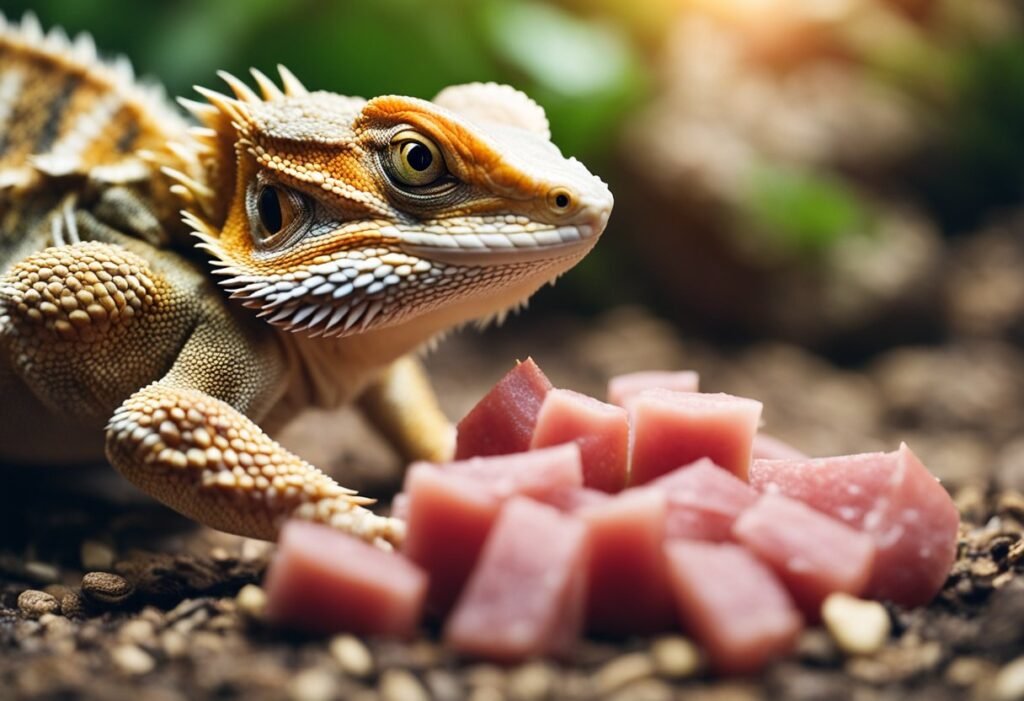
As responsible pet owners, it is our duty to ensure that our bearded dragons are healthy and happy. In addition to providing them with a balanced diet, it is crucial to monitor their health regularly. Here are some ways to keep your bearded dragon healthy:
Signs of Nutritional Deficiency
Bearded dragons require a balanced diet to stay healthy. If their diet lacks essential nutrients, they may develop nutritional deficiencies. Here are some signs of nutritional deficiency to look out for:
- Lethargy
- Loss of appetite
- Weakness
- Stunted growth
- Metabolic bone disease
If you notice any of these signs, it’s important to consult a veterinarian immediately. They can diagnose the deficiency and recommend a proper diet to correct it.
Regular Veterinary Check-Ups
Regular veterinary check-ups are essential to ensure your bearded dragon’s health. During the check-up, the veterinarian will examine your pet for any signs of illness or disease. They will also check their weight, body condition, and overall health.
It’s recommended to take your bearded dragon for a check-up at least once a year. However, if you notice any changes in their behavior or health, it’s best to consult a veterinarian immediately.
In conclusion, monitoring your bearded dragon’s health is crucial to ensure their well-being. By keeping an eye out for signs of nutritional deficiency and taking them for regular veterinary check-ups, you can ensure that your pet is healthy and happy.
Frequently Asked Questions
Is it safe for bearded dragons to consume any type of meat?
Not all types of meat are safe for bearded dragons to consume. Some meats, like fatty meats, can cause health problems for bearded dragons. It is important to choose lean meats and avoid meats that are high in fat.
Can bearded dragons have cooked meat as part of their diet?
Yes, bearded dragons can have cooked meat as part of their diet. However, it is important to ensure that the meat is cooked thoroughly and is not seasoned with any spices or herbs that could be harmful to your bearded dragon.
What are the risks of feeding raw chicken to bearded dragons?
Feeding raw chicken to bearded dragons can be risky as it may contain harmful bacteria like Salmonella. Raw chicken can also contain high levels of fat, which can lead to health problems in bearded dragons.
Are there any meats that bearded dragons can eat safely?
Yes, bearded dragons can safely eat lean meats like chicken, turkey, and beef. It is important to ensure that the meat is cooked thoroughly and is not seasoned with any spices or herbs that could be harmful to your bearded dragon.
Why might raw meat not be suitable for bearded dragons?
Raw meat can be risky for bearded dragons as it may contain harmful bacteria like Salmonella. Raw meat can also contain high levels of fat, which can lead to health problems in bearded dragons.
What alternative food options are recommended for bearded dragons?
Bearded dragons require a balanced diet that includes a variety of foods like vegetables, fruits, and insects. Some recommended food options include leafy greens, carrots, squash, crickets, and mealworms. It is important to ensure that your bearded dragon’s diet is balanced and meets their nutritional needs.
I, Mark Antonelli am highly interested in pet care tips. The experiences I gained through university life in animal sciences were also helpful to identify the best tricks for caring for and feeding varying kinds of pets. I know the majority of people love to own a pet. Yet, there is a guilty of owing a Bearded Dragon due to a lack of information about how much friendly and peaceful they are. I thought of filling this gap with detailed writings about this Pogona genus Bearded Dragon. All my team is also giving me great support to fulfil my mission. Hope you will enjoy the journey with us.

